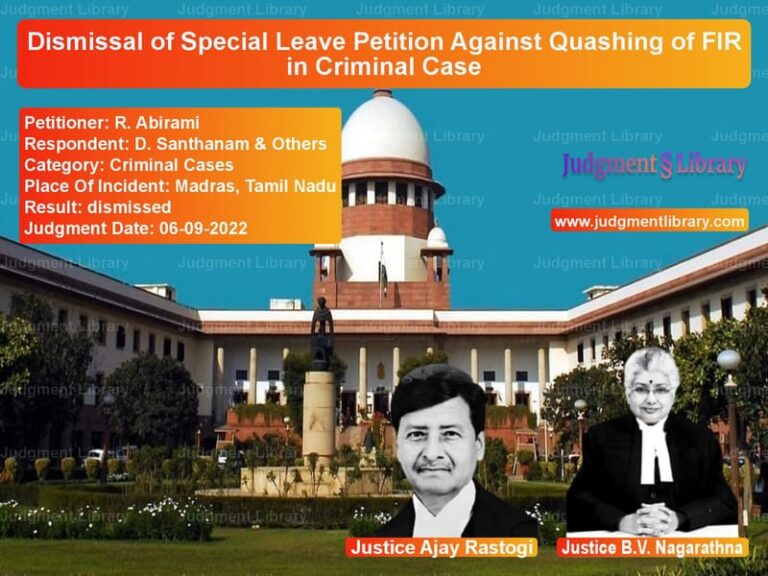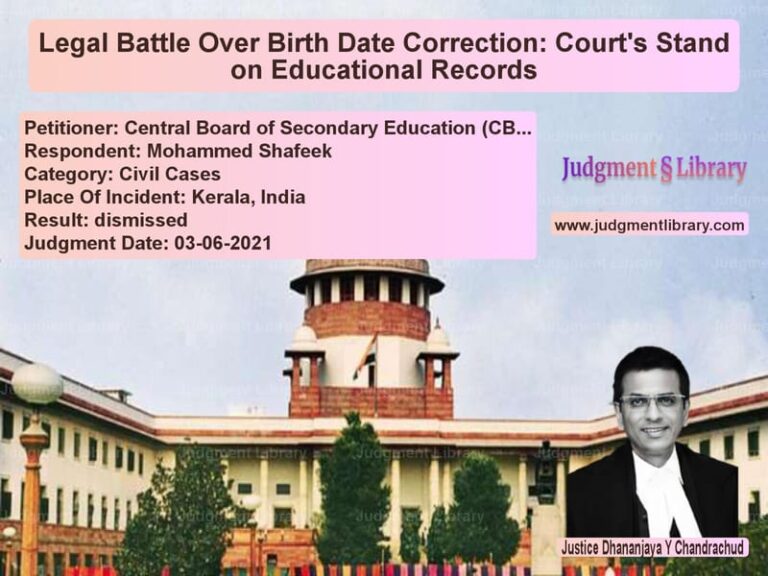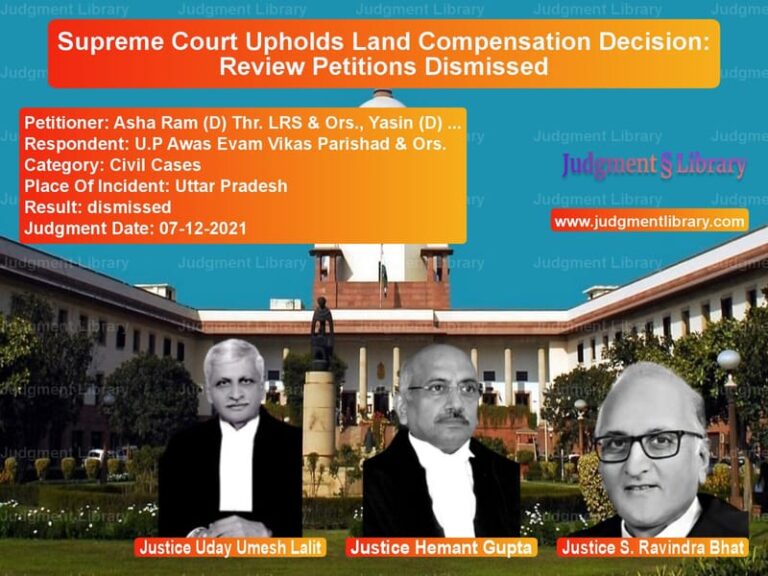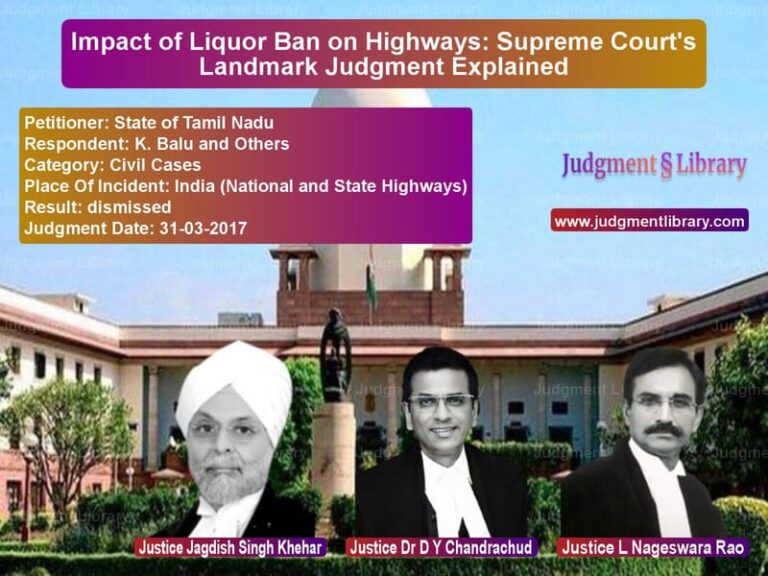Supreme Court Dismisses Revenue Appeals in Anardana Import Classification Case
The Supreme Court of India recently ruled in the case of Commissioner of Customs & Central Excise, Amritsar vs. M/s. D.L. Steels & Others, quashing the Revenue Department’s appeals concerning the classification of dried pomegranate seeds, commonly known as ‘anardana’. The case revolved around the interpretation of the Customs Tariff Act, 1975, and the appropriate classification under the Harmonized System of Nomenclature (HSN). The Supreme Court’s verdict provides critical guidance on the importance of trade usage and legal interpretation in tariff classifications.
Background of the Case
The dispute arose when M/s. D.L. Steels, an importer of anardana from Pakistan, classified the goods under Heading 1209.99.90, attracting a lower customs duty of 5% plus education cess. However, the customs authorities contested this classification, arguing that anardana should fall under Heading 0813.40.90, which carried a significantly higher duty rate of 30% plus education cess. A show-cause notice was issued, leading to the reclassification of the goods and the imposition of additional duty and penalties.
The importers challenged the classification before the Customs, Excise and Service Tax Appellate Tribunal (CESTAT), which ruled in their favor, leading to the Revenue Department’s appeal before the Supreme Court.
Petitioner’s Arguments (Commissioner of Customs & Central Excise, Amritsar)
The Revenue, in its appeal, contended:
- Anardana is nothing but dried pomegranate, and dried fruits are classifiable under Heading 0813.
- The Explanatory Notes to Heading 0813 specifically include dried fruits, and anardana should be classified under this heading.
- The adjudicating authority was correct in its assessment that anardana should not be classified under Heading 1209, as it is not a seed used for sowing but a dried fruit used as a spice or condiment.
- CESTAT failed to consider the larger implications of its ruling on revenue collection and customs classifications.
Respondent’s Arguments (M/s. D.L. Steels & Other Importers)
The importers opposed the Revenue’s arguments and submitted:
- Anardana is derived from wild pomegranates, which are distinct from the fresh pomegranate classified under Heading 0810.
- The seeds of wild pomegranates are not consumed as a fruit but are used as an acidulant and spice, making them more appropriately classified under Heading 1209, which covers seeds.
- The Explanatory Notes to Heading 1209 include fruit seeds, and anardana meets this description based on its use in the food industry.
- CESTAT relied on expert opinions from the Horticulture Department and food industry professionals, confirming that anardana is used as a spice, not as a dried fruit.
- Customs classification should align with trade parlance and industry practices, not just technical descriptions.
Supreme Court’s Observations
The Supreme Court, after reviewing extensive legal arguments, made the following key observations:
- Customs classifications should be based on trade usage and the commonly understood purpose of the product.
- Anardana is distinct from fresh pomegranate and is widely recognized as an acidulant and spice, not as a dried fruit.
- The Explanatory Notes to the HSN under Heading 1209 support its classification as a seed rather than a dried fruit.
- The Revenue’s argument that all dried pomegranates should be classified under Heading 0813 was not supported by sufficient evidence or trade practice.
- CESTAT’s ruling, based on expert opinions and industry usage, was valid and legally sound.
Key Legal Precedents Considered
The Supreme Court relied on multiple legal precedents while delivering its judgment:
- Union of India v. Prafulla Kumar Samal (1979): Established the principle that tax classifications must be backed by solid evidence and reasonable interpretation.
- State of Maharashtra v. Salman Salim Khan (2004): Reinforced the necessity of substantive proof in classification disputes.
- Manu Sharma v. State (NCT of Delhi) (2010): Highlighted the significance of judicial reasoning in appellate matters.
- Collector of Central Excise v. Wood Craft Products Ltd. (1995): Emphasized that trade parlance is crucial in determining tariff classifications.
Final Judgment
After considering all arguments, the Supreme Court ruled:
- The Revenue’s appeals were dismissed.
- CESTAT’s classification of anardana under Heading 1209.99.90 was upheld.
- The importers were not liable to pay the higher customs duty.
- The decision serves as a precedent for future classification disputes concerning agricultural and processed food products.
Implications of the Ruling
The Supreme Court’s ruling has broad implications for importers, customs officials, and policymakers:
- Provides clarity on the classification of anardana under customs law.
- Reinforces the role of trade parlance and industry practices in customs classifications.
- Protects importers from arbitrary reclassification of goods, ensuring stability in trade policies.
- Strengthens the reliance on expert opinions and factual evidence in tariff disputes.
- Prevents undue revenue loss due to misinterpretation of tariff rules.
This ruling is expected to have a significant impact on the classification of various agricultural products with multiple uses, ensuring that similar disputes are resolved in line with industry standards and international classification norms.
Petitioner Name: Commissioner of Customs & Central Excise, Amritsar.Respondent Name: M/s. D.L. Steels & Others.Judgment By: Justice Sanjiv Khanna, Justice Bela M. Trivedi.Place Of Incident: Amritsar, Punjab.Judgment Date: 10-07-2022.
Don’t miss out on the full details! Download the complete judgment in PDF format below and gain valuable insights instantly!
Download Judgment: commissioner-of-cust-vs-ms.-d.l.-steels-&-o-supreme-court-of-india-judgment-dated-10-07-2022.pdf
Directly Download Judgment: Directly download this Judgment
See all petitions in Customs and Excise
See all petitions in Tax Refund Disputes
See all petitions in Judgment by Sanjiv Khanna
See all petitions in Judgment by Bela M. Trivedi
See all petitions in dismissed
See all petitions in Quashed
See all petitions in supreme court of India judgments July 2022
See all petitions in 2022 judgments
See all posts in Taxation and Financial Cases Category
See all allowed petitions in Taxation and Financial Cases Category
See all Dismissed petitions in Taxation and Financial Cases Category
See all partially allowed petitions in Taxation and Financial Cases Category







